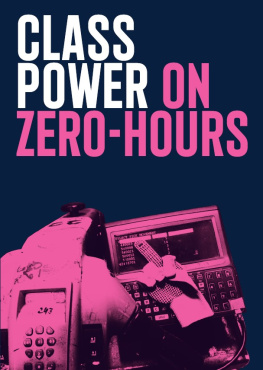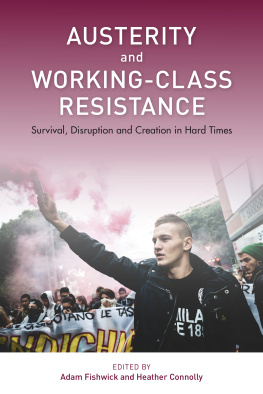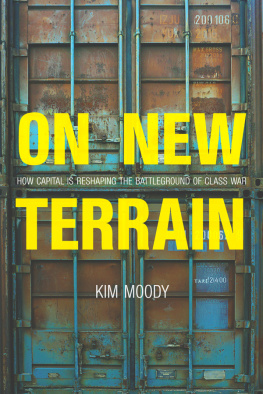Angry Workers - Class Power on Zero Hours
Here you can read online Angry Workers - Class Power on Zero Hours full text of the book (entire story) in english for free. Download pdf and epub, get meaning, cover and reviews about this ebook. City: London, year: 2020, publisher: AngryWorkers, genre: Politics. Description of the work, (preface) as well as reviews are available. Best literature library LitArk.com created for fans of good reading and offers a wide selection of genres:
Romance novel
Science fiction
Adventure
Detective
Science
History
Home and family
Prose
Art
Politics
Computer
Non-fiction
Religion
Business
Children
Humor
Choose a favorite category and find really read worthwhile books. Enjoy immersion in the world of imagination, feel the emotions of the characters or learn something new for yourself, make an fascinating discovery.
- Book:Class Power on Zero Hours
- Author:
- Publisher:AngryWorkers
- Genre:
- Year:2020
- City:London
- Rating:4 / 5
- Favourites:Add to favourites
- Your mark:
- 80
- 1
- 2
- 3
- 4
- 5
Class Power on Zero Hours: summary, description and annotation
We offer to read an annotation, description, summary or preface (depends on what the author of the book "Class Power on Zero Hours" wrote himself). If you haven't found the necessary information about the book — write in the comments, we will try to find it.
Class Power on Zero Hours — read online for free the complete book (whole text) full work
Below is the text of the book, divided by pages. System saving the place of the last page read, allows you to conveniently read the book "Class Power on Zero Hours" online for free, without having to search again every time where you left off. Put a bookmark, and you can go to the page where you finished reading at any time.
Font size:
Interval:
Bookmark:
CLASS POWER ON ZERO-HOURS

angryworkersworld.wordpress.com
workerswildwest.wordpress.com
Dedicated to Peter, a gentle stalwart, excellent comrade and friend.
In January 2014 we chose to move to a working class neighbourhood on the fringes of west London. We felt an urgent need to break out of the cosmopolitan bubble and root our politics in working class jobs and lives. We wanted to pay more than just lip service to the classic slogan, the emancipation of the working classes must be conquered by the working classes themselves. Over the next six years, comrades joined us and we worked in a dozen different warehouses and factories. We organised slowdowns on shop floors, rocked up on bosses and landlords doors with our solidarity network, and banged our heads against brick walls as shop stewards in the bigger unions. We wrote up all our successes, as well as the dead-ends, in our publication, WorkersWildWest, which we gave out to 2,000 local workers at warehouse gates at dawn. We tried to rebuild class power and create a small cell of a revolutionary organisation. This book documents our experiences. It is material for getting rooted. It is a call for an independent working class organisation.
At the time, we didnt have to leave careers to do this. We were either already doing blue collar jobs or floating about in Berlin, not really sure what to do next. One of us had worked in NGOs for ten years, leaving the sector with a sense that everything is corrupt and trying to change government policy was a waste of time. It therefore wasnt a massive leap to decide to move to a working class area where there were larger, more strategic workplaces to get jobs in. It didnt feel like dropping out as much as getting plugged in. A lot of people we knew were either doing boring office jobs, lonely PhDs, or burning out in their pursuit of a high-flying career. So, we didnt have too much FOMO.
We werent part of a bigger group at the time, so our only option was to lead by example. Get cracking and fingers crossed, people would hear about our efforts and join us. This was going to be a hard sell. Nobody on the London left had even heard of Greenford, not surprising due to its status as a cultural desert, in zone four on the Central line. But its where we chose to go, having done a few walkabouts beforehand to check out the scene. First impressions are that its a totally nondescript place where people are simply getting on with their humdrum lives. However, we quickly came to realise that this was a place that epitomised the daily realities behind the sensational headlines of the times: the flood of Polish immigration; the scourge of zero-hours contracts; the phenomenon of low wage growth and high employment; migrants in low- skilled work; the growth in warehousing and logistics; the low-waged sector boom after the financial crash in 2008; the hype of automation and robots taking over our jobs. Many left-wing commentators weigh in on these topics, but do they really have a clue what theyre talking about? By getting rooted in areas like this, we would be in a much better position to find out.
When you leave the tube station, the first thing you see is the Polish shop over the road. Next to that is a barbers, an estate agent and a chicken shop. You turn left, go under the railway bridge and Railway pub, past the bus stop that gets very overcrowded at certain times of the day with workers wearing high-vis jackets, another fifty metres further along and you hit the industrial estates and logistics parks. These include Tesco and Sainsburys distribution centres, a massive Royal Mail depot and a globally connected vegetable packing factory. The area is a mix of warehouses surrounded by overcrowded suburban residences. Greenford is small enough that people work and live locally, but big enough for us to not be blacklisted too soon once we started agitating with our co-workers. It was also a convenient bus ride from the Park Royal industrial area, one of the biggest in Europe and where one of us would later get a job at a food processing plant, as well as Heathrow Airport, probably Londons biggest workplace. It is locally concentrated and, at the same time, internationally connected. We were on a stretch called the western corridor, the main artery into London from the west, dotted with workplaces that made use of the global and national transport links. 60% of the food consumed in London is processed, packaged and circulated along this western corridor. This area typified one of capitalisms main contradictions: that workers have enormous potential power as a group, especially if they could affect food supplies into London, at the same time that they are individually weak. This is due to the fact that they have to scrape a living in the government- led hostile environment, with few social safety nets and effective organs to fight back against deteriorating working conditions in the modern low-waged sector. As revolutionaries, we wanted to support some self-organisation amongst these workers who have largely been ignored and neglected by the left.
So we packed our bags and headed from east to west London a real culture shock! From inner city housing estates and vibrant food markets to rows of suburban terraces and golf courses. We got a 450 a month room in a shared house advertised in a local newsagents window, paid the deposit and moved in. It was easy to get jobs. You just needed to sign up with a local temp agency, of which there were several, and they would send you somewhere the next day. We knocked up a CV and typed up our own reference letters (they werent checked anyway). Initially it was just the two of us, but over the years we were joined by other comrades from Hackney and Essex, as well as further afield: Poland, Spain, Slovenia, Australia, India, and France.
Between us we worked at a lot of local workplaces. One of us worked at the Jack Wills fashion warehouse, eyeing up the hundred-pound bags that were unceremoniously wrapped in plastic and gathering dust on a bottom shelf. We were made to run around with trolleys made of cardboard, picking items and putting back returns, having to meet high targets, your speed being measured with a scanning device all in boiling hot temperatures and under the brutal surveillance of a petite Nazi woman from Poland. One of us worked in a garden furniture warehouse, three of us worked at the Sainsburys chilled distribution centre, and one of us spent six months stealing samples from a Neals Yard cosmetics warehouse where they certainly werent treating their workers more ethically than their botanical ingredients. One of us drove around on an electric cart, lugging drinks around to be sent to Waitrose supermarkets. One of us worked at a 3D printer assembly plant, getting an insight into whats behind all this talk about liberating technology. One of us did a hectic unpaid trial at the Charlie Bighams food factory, another at a factory that makes Indian fried snacks and samosas on piece-rate. One of us was a Bendi forklift driver, filling up on fry-ups in the free canteen at Alpha LSG, an airline caterer. We waited on business twats at a Premier Inn hotel, swept leaves and collected bins with Amey, outsourced to do the street cleansing for Ealing Council. But we spent the most blood, sweat and tears at two places: as a delivery driver for supermarket giant Tesco, and as a forklift driver at a food manufacturing factory, Bakkavor, which supplies all the major supermarkets with houmous and ready-meals. Our work and organising reports from these employers make up the biggest section of this book, in chapters 7-10.
Font size:
Interval:
Bookmark:
Similar books «Class Power on Zero Hours»
Look at similar books to Class Power on Zero Hours. We have selected literature similar in name and meaning in the hope of providing readers with more options to find new, interesting, not yet read works.
Discussion, reviews of the book Class Power on Zero Hours and just readers' own opinions. Leave your comments, write what you think about the work, its meaning or the main characters. Specify what exactly you liked and what you didn't like, and why you think so.





